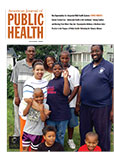Abstract:
Policy directed at influencing social and environmental determinants of health is an increasingly important component of successful community-based health promotion. A challenge in crafting effective policy is to achieve a balance between sound science and political pragmatism that meets the needs of populations throughout the life course. Policies directed at adolescents may be particularly effective, as factors outside the home become increasingly important at this stage of development in shaping behaviors known to affect health, including smoking, eating, and sexual practices. Translating applied research into appropriate and effective policies has the potential to improve the health and lives of entire cohorts of adolescents and may carry over into later stages of their lives. Unfortunately, limited time, funding, and training can relegate policy implications and development to little more than an afterthought in most public health research.
While the evaluation and research results featured in this month’s forum on adolescent health are significant contributions, notably absent are meaningful policy papers that highlight the inadequacies of current adolescent policy, present information that is useful to policymakers, and advance the scientific awareness of policy development. Many aspects of adolescent health call for policy discussion. Access to health care and abstinence education are 2 areas in particular in which consistent empirical and programmatic findings ought to be better reflected in policy.
Authors
- Amy Bleakley
- Jennifer A. Ellis


